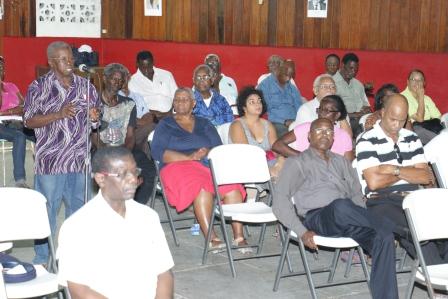Guyana has yet to see a figure emerge to bridge its racial divide like late former President Nelson Mandela managed to do in South Africa.
“After 50 years of independence we are still a racially divided society. There is nobody who has emerged yet as a Mandela figure,” former ambassador Ronald Austin, who served in South Africa during the period of the liberation struggle, told the audience at a commemorative symposium on the life and works of Mandela, hosted by the Burnham Foundation at the Critchlow Labour College last Friday evening.
Austin said Mandela left a blueprint for any society that is divided by race and that South Africa seemed to be able to address its racial problems in a more manageable way than we seem to have done in Guyana.
Mandela, an anti-apartheid revolutionary, politician and philanthropist who served as President of South Africa from 1994 to 1999, died on December 5th at the age of 95. He was also South Africa’s first black chief executive and the first to be elected in a fully representative democratic election. He spent over 27 years in prison and was released in 1990 during a time of escalating civil strife.

Austin, in giving a historical perspective on Mandela’s life, contended that he was a representative of a civilization superior to what the Dutch tried to establish in South Africa. Austin said that when Mandela was released from prison, he decided that he was not only a better man, but that he would demonstrate to the other races in South Africa that he would lead the nation peacefully. “Coming out of prison he decided that he represented something that is greater than what they tried to do to him,” he said.
He also lauded Mandela for his humbleness. “That is what has struck me most about Mandela. I don’t know many people who have emerged from prison without bitterness. When they held the rugby finals in 1995 and they asked Mandela what anthems you are going to play on this occasion, he said play both of them,” he noted.
Austin asserted that Mandela’s life and achievements stood by themselves. “There is nobody like Nelson Mandela. South Africa stood on the brink of a major social disaster after Mandela’s release from prison. They could have gone in a number of directions, racially, politically. What it is Mandela did? He created his own party and today South Africa stands a country that has been radically transformed. It has prospered and it can easily stand as a model for the rest of African countries,” he argued.
Austin said Mandela was an extraordinary person. “What he saw in 1989 not one single member could see what it is he was trying to do. What Mandela saw in the background for what he was doing is the burning wall, the transformation that is going on in the rest of the world and he understood that the time had come to negotiate,” he said.
Vincent Alexander, who served as Chairman of the Young Socialist Movement during the period of its active support for the struggle in Southern Africa, also spoke at the symposium and touched on Guyana’s commitment to the struggle. “Today we come to salute the life of Nelson Mandela; a life that was committed to struggle not only for the people of South Africa but all humanity. We followed Mandela’s growth as a thinker and freedom fighter; a man who grew from peaceful struggle to armed struggle and then to diplomacy and ultimately to victory; a man who grew from partisan racial struggle—when Mandela started the struggle his view was that Africans in South Africa should go it alone, they should not join with any other group for their struggle of self-determination. He started there but he ended up in universal struggle for humanity…What he stood for lives on in us and we are forever indebted in him,” Alexander added.
He said Burnham mobilised internally in the moral and material way in aiding the struggle of South Africa.
“Much has been said and will be said on Guyana’s international contribution to that struggle. There are still those who would wish to describe Guyana’s contribution as on the path of brinkmanship of our founder leader Linden Forbes Sampson Burnham,” he said, while announcing his intention of debunking any such notion.








